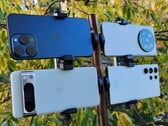
Test du Google Pixel 8a : smartphone unique en son genre dans le milieu de gamme
Google Tensor G3 | ARM Mali-G715 MP7 | 6.10" | 188 g

Le Tensor G3 marque la troisième génération de puces propres à Google pour les smartphones et les tablettes basées sur Android. Ce SoC est utilisé pour la première fois dans les Pixel 8 et Pixel 8 Pro et Google le considère comme un appareil haut de gamme.
Le processeur du Tensor G3 est composé de trois clusters. Le premier abrite un seul cœur puissant Cortex-X3, qui peut fonctionner jusqu'à 2,91 GHz, le deuxième offre quatre cœurs de performance (Cortex-A715) avec jusqu'à 2,37 GHz et le troisième cluster a quatre cœurs d'efficacité (Cortex-A510) avec jusqu'à 1,7 GHz. Les vitesses d'horloge ne sont donc pas particulièrement élevées, de sorte que la performance pure du processeur se situe plutôt au niveau d'un SoC de classe moyenne supérieure.
Un processeur ARM Mali-G715 est utilisé comme unité graphique. Google ne précise pas le nombre exact de cœurs, mais les benchmarks et l'absence de ray tracing suggèrent une version à sept cœurs (G715MP7).
Le cœur des SoC Tensor est l'unité de traitement Tensor (TPU), qui est responsable des tâches d'IA et de ML. Ici aussi, Google doit au public des informations plus précises et se contente d'indiquer que des modèles d'IA 150 fois plus complexes peuvent être calculés sur l'appareil.
En outre, Google intègre son sous-système de sécurité isolé, qui utilise à nouveau le coprocesseur Titan M2 et fournit une protection supplémentaire pour ses propres données sur une base matérielle. Le modem G5300i est basé sur l'Exynos 5300 et prend en charge le Wi-Fi 7.
Le Tensor G3 est fabriqué dans le processus actuel de 4nm chez Samsung.
| Nom de code | Zuma - Cortex X3 / A715 / A510 |
| Fréquence | 1700 - 2910 MHz |
| Cache de Niveau 3 (L3) | 4 MB |
| Nombres de cœurs/threads simultanés supportés | 9 / 9 1 x 2.9 GHz ARM Cortex-X3 4 x 2.4 GHz ARM Cortex-A715 4 x 1.7 GHz ARM Cortex-A510 |
| Lithographie (procédé de fabrication) | 4 nm |
| Fonctionnalités | Wi-Fi 7, Bluetooth 5.3, LPDDR5x-RAM, Dual-Band GNSS, Titan M2 |
| Carte graphique | ARM Mali-G715 MP7 ( - 890 MHz) |
| 64 Bit | Prend en charge les instructions 64 Bit |
| Architecture | ARM |
| Date de présentation | 10/04/2023 |
| Lien redirigeant vers une page externe du produit | store.google.com |





Google Pixel 8a: ARM Mali-G715 MP7, 6.10", 0.2 kg
Autres tests » Google Pixel 8a
Google Pixel 8: ARM Mali-G715 MP7, 6.20", 0.2 kg
Autres tests » Google Pixel 8
Google Pixel 8 Pro: ARM Mali-G715 MP7, 6.70", 0.2 kg
Autres tests » Google Pixel 8 Pro
Google Pixel 8a: ARM Mali-G715 MP7, 6.10", 0.2 kg
» Google Pixel 8a surpasse l'iPhone 15 Apple dans l'analyse d'affichage DxOMark, mais n'est pas exempt de défauts
Google Pixel 8: ARM Mali-G715 MP7, 6.20", 0.2 kg
» Problèmes d'affichage du Google Pixel 8 : Le programme de réparation permet de bénéficier de 3 ans de service gratuit
Google Pixel 8a: ARM Mali-G715 MP7, 6.10", 0.2 kg
» Le Google Pixel 8a est loin derrière le Pixel 8 dans l'analyse de l'appareil photo DxOMark, mais devance le Samsung Galaxy S24
Google Pixel 8: ARM Mali-G715 MP7, 6.20", 0.2 kg
» Google publie de nouvelles options de couleur pour les Pixel 8 et Pixel 8 Pro avec des bonus de lancement
Google Pixel 8 Pro: ARM Mali-G715 MP7, 6.70", 0.2 kg
» Google publie de nouvelles options de couleur pour les Pixel 8 et Pixel 8 Pro avec des bonus de lancement
» La nouvelle option de couleur du Google Pixel 8 Pro a fuité avant le jour du lancement
Google Pixel 8: ARM Mali-G715 MP7, 6.20", 0.2 kg
» Google Pixie au lieu de Google Assistant : une nouvelle aide IA plus personnalisée pour améliorer les Pixel 9 et Pixel 9 Pro
Google Pixel 8 Pro: ARM Mali-G715 MP7, 6.70", 0.2 kg
» Google Pixie au lieu de Google Assistant : une nouvelle aide IA plus personnalisée pour améliorer les Pixel 9 et Pixel 9 Pro
Google Pixel 8: ARM Mali-G715 MP7, 6.20", 0.2 kg
» Google Pixel 8 Pro : Les premiers tests de Video Boost révèlent les limites de l'édition par l'IA
Google Pixel 8 Pro: ARM Mali-G715 MP7, 6.70", 0.2 kg
» Google Pixel 8 Pro : Les premiers tests de Video Boost révèlent les limites de l'édition par l'IA
» Google Pixel 8 Pro : comment fonctionnera la prochaine fonctionnalité Video Boost ?
Google Pixel 8: ARM Mali-G715 MP7, 6.20", 0.2 kg
» Verdict sur le Google Pixel 8 : un smartphone solide dans l'ensemble avec des faiblesses mineures
Google Pixel 8 Pro: ARM Mali-G715 MP7, 6.70", 0.2 kg
» Google Pixel 8 Pro : Le nouveau design de l'écran provoque de "petites bosses" pour certains appareils
» Comparaison des processeurs pour ordinateur portable
Comparaison de tout les processeurs mobiles
» Processeurs mobiles - liste des benchmarks
Liste des benchmarks de l'intégralité des processeurs pour portables
Top 10
» Le Top 10 des PC portables multimédia
» Le Top 10 des PC portables de jeu
» Le Top 10 des PC portables de jeu légers
» Le Top 10 des ordinateurs portables bureautiques
» Le Top 10 des PC portables bureautiques premium/professionnels
» Le Top 10 des Stations de travail mobiles
» Le Top 10 des Ultraportables
» Le Top 10 des Ultrabooks
» Le Top 10 des Convertibles
» Le Top 10 des Tablettes
» Le Top 10 des Tablettes Windows
» Le Top 10 des Smartphones
» Le Top 10 des PC Portables á moins de 300 euros
» Le Top 10 des PC Portables á moins de 500 euros
» Le Top 25 des meilleurs écrans d'ordinateurs